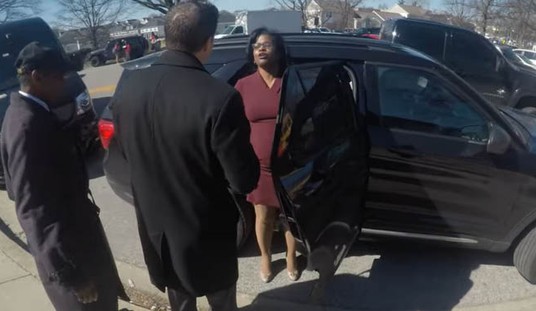The violent protests in Ferguson, Missouri following the shooting death of 18-year-old Michael Brown only grew more intense over the weekend. As the primarily, but not exclusively, African-American locals continue express dissatisfaction with the state of American law enforcement, some of the nation’s commentators are examining the societal circumstances which have led these protesters to believe they have so few stakes in the system that they are prepared to take the risks associated with participating in mass violence.
A few political commentators have observed that there is something gravely wrong with our urban centers. They see the violence in Ferguson, which has been welcomed and celebrated by sympathizers in many of America’s great metropolises, as evidence of the breakdown of the social contract. Though perspectives vary widely as to what element of that contract is in breach.
National Review’s Kevin Williamson, for example, noted that many of these cities have experimented with virtually uninterrupted progressive governance for over half a century, promoted the state over the family, and put their faith in redistributive economic policies to provide social mobility. The results are predictable disappointment and, in some regrettable cases, violence.
Progressives spent a generation imposing taxes and other expenses on urban populations as though the taxpaying middle class would not relocate. They protected the defective cartel system of public education, and the union money and votes associated with it, as though middle-class parents would not move to places that had better schools. They imposed burdens on businesses, in exchange for more union money and votes, as though businesses would not shift production elsewhere. They imposed policies that disincentivized stable family arrangements as though doing so would have no social cost.
But the liberal perspective is quite different. A handful of influential writers on the left are raising concerns about the coming “race war.”
“This fist-shaking of everyone’s racial agenda distracts America from the larger issue that the targets of police overreaction are based less on skin color and more on an even worse Ebola-level affliction: being poor,” wrote former NBA player and Time columnist Kareem Abdul-Jabbar in his column which warned of a coming “race war” that won’t be about race at all.
“Of course, to many in America, being a person of color is synonymous with being poor, and being poor is synonymous with being a criminal,” he added.
With each of these shootings/chokehold deaths/stand-your-ground atrocities, police and the judicial system are seen as enforcers of an unjust status quo. Our anger rises, and riots demanding justice ensue. The news channels interview everyone and pundits assign blame.
Abdul-Jabbar did not excuse the violence which has erupted in Ferguson, but he did seem to absolve those who believe that the hopelessness of their situation justifies dramatic actions designed to drive national attention toward their circumstances.
“The middle class has to join the poor and whites have to join African-Americans in mass demonstrations, in ousting corrupt politicians, in boycotting exploitative businesses, in passing legislation that promotes economic equality and opportunity, and in punishing those who gamble with our financial future,” Abdul-Jabbar added.
The Daily Beast’s Michael Tomasky was more blunt in his column noting that Ferguson is one battle in the larger, ongoing “urban-suburban race war.”
“[T]here’s a larger story here about race in America that involves the transformation of inner-ring suburbs over the last 30 years, and the response to that transformation, which have combined to create tensions that often rage in the suburban areas that surround our major cities,” he wrote. “These tensions are almost wholly about race.”
The Daily Beast columnist echoed themes similar to those touched on by Williamson about gentrification, tax policy, and the flight of the tax base. Tomasky’s conclusions diverged slightly, though, from those of the National Review columnist.
So even as black people pushed their way out into the suburbs, they typically haven’t done so in large enough numbers to gain real political power. This means that while the political power in many cities is in black hands today, whites still tend to run things in the counties within which those cities rest. Thus, one sub-story of the last 20 or so years in America has been a quiet but constant power struggle between municipal and county governments over who has what authority.
“The specific issue is this that juries in the United States are drawn from county-wide population pools,” Tomasky wrote of the situation in Ferguson. “This means, as the criminologist William Stuntz has observed, that people from large counties with exurbs and farms are often sitting in judgment of urban kids.”
While the language about a “race war” is somewhat irresponsible and largely unfounded (and would be the considered the height of recklessness had they been written by a conservative), the notion that some of these protests were sparked by a sense of desperation at the start is valid and important. It is worth having a national discussion about the criminal justice system, which many on the right and left believe is in desperate need of reform. But it is not fair to suggest that the current momentum and the tempo of these protests are entirely due to social dissatisfaction.
On Sunday night, amid some of the worst rioting in Ferguson yet, Missouri Gov. Jay Nixon was forced to call in the National Guard. The officer in charge of the police response in Ferguson, Capt. Ron Johnson, determined that premeditated and coordinated attacks were being executed by protesters against police and on private businesses. Directionless expressions of social distress by a disenfranchised minority do not take the form of managed and focused assaults. That is the work of the criminals who have hijacked these protests for their own ends.
These columnists are correct to examine the origins of these protests and determine that they are founded in root causes far more universal than the shooting death of one teenager. They have, however, apparently evolved to a point now where they no longer resemble social unrest at all. In fact, they look much more like the majority of history’s reptilian mobs; common, recognizable, and fleeting, the majority of those violent outbursts did not herald some grand social transformation.








Join the conversation as a VIP Member